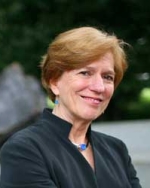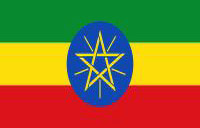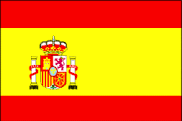
Nina V. Fedoroff Ph.D.
National Medal of Science - Biological Sciences 2006
Plant Molecular Biologist. Geneticist. First to clone and characterize maize transposons. Founding director, Huck Institutes of the Life Sciences. Interests: Education, Public Policy.
"It's as much wanting to succeed as it is to using your brains. I've seen very bright people fall out of the system".
Vita
EDUCATION
PRESENT POSITIONS
PREVIOUS POSITIONS
SCHOLARSHIPS AND FELLOWSHIPS
MISCELLANEOUS EMPLOYMENT AND EXTRACURRICULAR ACTIVITIES
HONORS AND AWARDS
PROFESSIONAL SOCIETIES
ACADEMIC LEADERSHIP
ADVISORY FUNCTIONS, STATE DEPARTMENT AND USAID 2007-2010
I. Increasing S&T Literacy in the State Department
II. Building Science Partnerships
III. Providing Advice and Counsel on Scientific Issues to the State Department
IV. Strategic Planning
THE GLOBAL KNOWLEDGE INITIATIVE (GKI)
THE CENTER FOR DESERT AGRICULTURE, KING ABDULLAH UNIVERSITY OF SCIENCE AND TECHNOLOGY (KAUST), 2010-2014.
EDUCATION:
B.S., Syracuse University, Biology and Chemistry, summa cum laude (1966)
Ph.D., The Rockefeller University, Molecular Biology (1972)
PRESENT POSITIONS:
Evan Pugh Professor Emerita, Biology Department and the Huck Institutes of the Life Sciences, Pennsylvania State University, 2011-
Member of External Faculty, Santa Fe Institute, 2003-
PREVIOUS POSITIONS:
Distinguished Professor of Biosciences, King Abdullah University of Science and Technology (KAUST), Thuwal, Saudi Arabia, 2011-14
Science and Technology Adviser to the Secretary of State, Department of State, 2007-2010.
Science and Technology Adviser to the Administrator of USAID, 2007-2010.
Willaman Professor of Life Sciences and Evan Pugh Professor, Biology Department and the Huck Institutes of the Life Sciences, Pennsylvania State University, 1995-2010
Director, Director, Life Science Consortium (now the Huck Institutes of the Life Sciences) (http://www.lsc.psu.edu), 1995-2002
Director, Biotechnolgy Institute (http://www.lsc.psu.edu/biotech.html), 1995-2002
Staff Member, Carnegie Institution of Washington, Department of Embryology, 1978-1995
Assistant Professor, Associate Professor, and Professor, Biology Department, Johns Hopkins University, 1978-1995
Research Associate, Carnegie Institution of Washington, Department of Embryology, 1977-78.
Damon Runyan-Walter Winchell and NIH post-doctoral fellow, Carnegie Institution of Washington, Department of Embryology, 1974-77.
Acting Assistant Professor, Biology Department, University of California, Los Angeles, 1972-74
SCHOLARSHIPS AND FELLOWSHIPS:
Syracuse University, full tuition scholarship, 1960-61, 1963-66
National Science Foundation, Undergraduate Research Awards, 1963-65
National Science Foundation Predoctoral Fellowship, 1966-71
Rockefeller University Fellowship, 1971-72
Damon Runyon-Walter Winchell Postdoctoral Fellowship, 1974-75
National Institutes of Health Postdoctoral Fellowship, 1975-77
MISCELLANEOUS EMPLOYMENT AND EXTRACURRICULAR ACTIVITIES:
Assistant Manager, Translational Bureau, Biological Abstracts, 1962-63
Free-lance translator and abstracter (Russian-English), 1963-66. Employed by Biological Abstracts, Phila., PA., and the Air Force Language School, Syracuse University, Syracuse, NY
Flutist, Syracuse Symphony Orchestra, 1964-66; free-lance performance and teaching, 1963-66
Developmental Biology Panel, National Science Foundation, 1979-80
Scientific Advisory Panel on Applied Genetics, Office of Technology Assessment, US Congress, 1979-80
NIH Recombinant DNA Advisory Committee, 1980-84
Life Sciences Research Foundation, Peer Review Committee, 1982-1988
Plant Postdoctoral Fellowship Peer Review Committee, National Science Foundation, 1984
Editor, Gene, 1981-84
Phi Beta Kappa Visiting Scholar, 1984-85
Board of Reviewing Editors, Science, 1985
Organizing Committee, International Symposium on Plant Transposable Elements, 1987
Consultant, United AgriSeeds (1983-1989); Dow Elanco, 1989-90.
NIH Recombinant DNA Advisory Committee Working Group on Guideline Revisions, 1987.
Commission on Life Sciences and Board on Basic Biology, NRC, Nat. Acad. of Sciences, 1984-90
Scientific Advisory Committee, Competitive Research Grants Office, USDA, 1987-90
Scientific Advisory Board, Center for Agricultural Biotechnology, University of Md., 1987-92.
Visiting Committee, Dept. Cell. and Dev. Biology, Board of Overseers, Harvard College, 1988-91
Scientific Advisory Committee, Japanese Human Frontier Science Program, 1988
Biotechnology Committee, National Research Council, National Academy of Sciences, 1988-90
Co-chair, US-USSR Interacad. Workshop on Plant Mol. Biology Applied to Agriculture, 1989
Board of Directors, Genetics Society of America, 1990-93
Committee of Visitors, Developmental Biology Program, National Science Foundation, 1991
Advisory Board, The Plant Journal, 1991-98
Board of Trustees, BIOSIS, 1991-96
Council, National Academy of Sciences, 1991-94
Damon Runyon-Walter Winchell Cancer Research Fund, guest reviewer, 1992
American Society for Cell Biology, Scientific Program Committee, 1992
Committee on the Visiting Scholar Program, Phi Beta Kappa, 1992-93
Board of Directors, International Science Foundation, 1992-93
Biological Sciences Advisory Board, NSF Directorate for Biol. Sciences, 1994-98; Chair, 1996
NSF, Committee of Visitors, Division of Biological Instrumentation and Resources, 1995
National Research Council, Committee on Research Opportunities and Priorities for the EPA, 1996
Organizing Committee, XVI Botanical Congress, 1997-98
National Research Council Roundtable on Work, Learning, and Assessment, 1997-98
Visiting Committee on the Biological Sciences, Office of the President, Cornell University, 1998
Co-organizer with Joel Cohen of NAS Beckman Symposium: "Plant and Population, is there time?" 5-6 December 1998 (http://www.lsc.psu.edu/nas/colloquium.html).
Organizing Committee, Ensuring Food Security, Protecting the Environment, Reducing Poverty in Developing Countries: Can Biotechnology Help? A CGIAR Symposium, 21-22 October 1999 (http://www.cgiar.org/cgnas.htm).
Editor, Perspectives in Biology and Medicine, 1990-2001
International Advisory Board, Englehardt Institute of Molecular Biology, Moscow, 1993-2003
Editorial Board, Proceedings of the National Academy of Sciences, 1995-2001
Board of Directors, Sigma-Aldrich Chemical Company, 1996-2007
Editorial Board, MethodsFinder database, BIOSIS, 1998-2001
Mars Sample Protocol Oversight and Review Committee, NASA, 2000-01
Board of Directors, AAAS, 2000-04
National Science Board, National Science Foundation (presidential appointment) 2000-06
Chair, Publications Committee, National Academy of Sciences, 2001-2007
Science Advisory Committee, Evogene, Rohovoth, Israel, 2003-present
FDA Food Advisory Committee, Subcommittee on Genetically Modified Foods, 2003
Board of Governors, Institute for Complex Adaptive Matter, Los Alamos Laboratory, 2003-present
National Research Council Committee on the Future of Mathematics in Biology 2003-04
Editorial Board, Epigenetics, 2006-present
Science Steering Committee, Santa Fe Institute 2003-10
Board of Trustees, Library of Alexandria, Egypt, 2009-present
Science Advisory Board, Santa Fe Institute, 2011-present
President, American Association for the Advancement of Science (AAAS), 2011-12; Chairman of the Board, 2012-2013.
Biotechnology Council, Global Agenda Councils, World Economic Forum, 2012-14
Editorial Board, Agriculture and Food Security, 2012-present
HONORS AND AWARDS:
Phi Beta Kappa
Sigma Xi
American Academy of Arts and Sciences, elected 1989
National Institutes of Health Merit Award (10 year research grant, 1989-99)
National Academy of Sciences, elected 1990
Howard Taylor Ricketts Award, 1990
Outstanding Contemporary Woman Scientist, New York Academy of Sciences, 1992
Named one of the 50 most outstanding alumni of the Damon Runyan-Walter Winchel Found., 1996
Sigma Xi John P. McGovern Science and Society Medal, 1997
American Academy of Microbiology, elected 1998
Evan Pugh Professorship, The Pennsylvania State University, 2002
European Academy of Sciences, elected 2002
Arents Pioneer Medal, Syracuse University, 2003
National Medal of Science, 2006
Honorary Doctorate, Rockefeller University, 2008
Leadership in Science Public Service Award, American Society of Plant Biology, 2010
International Academy of Food Sciences and Technology, elected 2010
Fellow, American Association for the Advancement of Science (AAAS), elected 2011
Nevada Medal, 2013
PROFESSIONAL SOCIETIES:
Genetics Society of America
American Society for Biochemistry and Molecular Biology
International Society for Plant Molecular Biology
American Society for Plant Biology
American Association for the Advancement of Science
ACADEMIC LEADERSHIP
Early in my tenure at the Penn State, I was asked to organize a program to improve the life sciences in the university. I conceptualized, organized, implemented and directed an intercollege organization initially called the Life Sciences Consortium (LSC), now called the Huck Institutes of the Life Sciences (HILS, http://www.huck.psu.edu/). Its objective is to enhance the life sciences enterprise and support multidisciplinary initiatives in research, educational outreach and commercialization. I served as the founding director from 1995-2002.
HILS serves more than 500 Penn State faculty in 7 participating colleges. The member colleges are the Eberly College of Science, the College of Medicine (Hershey, PA), the College of Agricultural Sciences, the College of Liberal Arts, the College of Health and Human Development, the College of Engineering and the College of Earth and Mineral Sciences. Because of its large membership, the HILS is a very different kind of organization than the Centers and Institutes of Penn State's Intercollege Research Program. HILS is a "virtual" organization which offers financial and organizational support to Penn State faculty working towards its objectives of improving the quality of the life sciences enterprise and encouraging collaborative multi-disciplinary research and teaching. Because of its limited budget and large membership, the HILS sought to remain embedded in the organizational structure of the university, while creating opportunities for new interactions. This was accomplished by opening HILS programs to all PSU faculty on a competitive bases, supporting services and facilities that are available on a fee-for-service basis to all PSU faculty, providing funds for faculty hires in participating colleges on a competitive basis, and supporting a group of multidisciplinary Options under an umbrella graduate program.
Faculty development. At the time that HILS was founded, it was the designated the vehicle through which 50 new life sciences faculty were to be co-funded. All of the appointments are full appointments in departments of the member colleges, not joint appointments with the HILS. The departments and colleges, as well as the disciplinary areas, in which new faculty are co-funded from the HILS, are selected through a competitive process.
Graduate education. HILS developed an "umbrella" graduate program, called the Integrative Biosciences (IBIOS) Graduate Degree Program. The program originally comprised 9 subprograms, called "Options," each with its own faculty group drawn from 2 or more colleges. The IBIOS Options have developed innovative concepts in graduate education and bring together students from a variety of different disciplines. The Directors of the IBIOS program have been instrumental in the development of fully electronic classrooms which make it possible to teach courses with participation of students and instructors on both the UP and HMC campuses. HILS also supports a variety of activities that promote the recruitment of better graduate students in the life sciences to Penn State, including summer undergraduate research in PSU life science laboratories. A new graduate educational initiative, a Biotechnology Masters Degree Program was developed through the HILS's Biotechnology Institute. The program is a collaborative effort among faculty of the Eberly College of Science, the College of Agricultural Sciences, and the College of Engineering and its curriculum development is also being funded by a Sloan Foundation grant.
Outreach. The outreach activities of the HILS are centered in the Biotechnology Institute and its Shared Technology Facilities. Dr. Escote-Carlson teaches basic molecular biology for graduate students, faculty and staff. She runs a molecular biology workshop for industry in cooperation with the industrial outreach instructional programs housed in the Biochemistry and Molecular Biology Department of the Eberly College of Science. In addition, Dr. Escote-Carlson has organized an outreach educational program for high school students which has both brought students into the molecular biology instructional laboratory of the Biotechnology Institute and has taken HILS graduate students to local high schools to teach. Directors of the Shared Technology Facilities also actively participate in a wide range of outreach activities, both independently and in collaboration with the Biotechnology Institutes instructional program.
Another aspect of outreach that intersects with both educational and research objectives is the Life Science Alliance with Industry. The Life Science Alliance is a developing effort of both the graduate faculty and the Biotechnology Institute to establish relationships between university and industrial researchers. Its objectives are to encourage interactions between industrial researchers and Penn State faculty and to develop opportunities for IBIOS (and other) graduate students to do internships in industry. While this program is, as yet, embryonic, it has already brought in a number of industry speakers in its Life Science Alliance with Industry Lecture Series.
Research Support. The HILS supports a number of Shared Technology Facilities. These are laboratories or other types of facilities that serve a broad spectrum of faculty, primarily life scientists. The HILS -supported PSU Shared Technology Facilities are the Nucleic Acid Facility, the Microarray Facility, the Mass Spectrometry Facility, the Electron Microscopy Laboratory, the Flow Cytometry Facility, the Hybridoma and Cell Culture Laboratory and the Center for Computational Biology. The Shared Technology Facilities are partially subsidized by the HILS , which pays the salaries of all of the facility directors. All of the facilities, with the exception of the Center for Computational Biology (CCB), operate on a fee-for-service basis and most of them employ at least one technician.
The Innovative Biotechnology Research Fund was a seed-grant fund that stimulated new research in the life sciences and encourage the transfer of this knowledge to society through commercialization. Awards are made competitively based on brief applications and only to Penn State faculty. The fund's purpose was to enable researchers to explore new ideas and obtain the preliminary data needed for the success of a proposal in a federal granting agency competition. Collaborative research, as well as research leading directly to commercialization, were especially encouraged.
Commercialization. As Director, I catalyzed the donation of a laboratory building for use as a Penn State business incubator and supported the development of the Zetachron Center for Science and Technology Business Development. A joint project of the Ben Franklin organization and the Biotechnology Institute funded the development of the Penn State Gateways program, a systematic guide to the development of start-ups. This project resulted in a McCune grant of several hundred thousand dollars for use in the further development of start-up businesses, as well as the establishment of a "deal flow" in support of further start-ups.
Life Sciences Building. As Director, I worked with the university to develop plans for a new Life Sciences Research Building. We created a complex that connects the Chemistry Building and the Life Sciences building through an above-ground bridge, which also serves as a meeting and poster-session venue, and provides an interactive space for casual discussions, as well as more formal receptions.
ADVISORY FUNCTIONS, STATE DEPARTMENT AND USAID 2007-2010
The Office of the Science and Technology Adviser to the Secretary (STAS) was established in September 2000 in response to a National Research Council (NRC) study titled The Pervasive Role of Science, Technology, and Health in Foreign Policy, commissioned by the Department of State. The office was assigned four core responsibilities: (1) increasing S&T literacy in the State Department, (2) building S&T partnerships, (3) providing advice and counsel on scientific issues to the Department; and (4) strategic planning. I was appointed the third STAS in 2007 and took on the additional role of serving as the S&T Adviser to the Administrator of the U.S. Agency for International Development (USAID), pursuant to a 2006 NRC report titled The Fundamental Role of Science and Technology in International Development and at the Administrator's request.
I. Increasing S&T Literacy in the State Department:
Bringing Scientists and Engineers into the State Department and USAID: Two programs increase the representation of scientists: the American Association for the Advancement of Science (AAAS) Science Diplomacy Fellows program and the Jefferson Science Fellowship (JSF) program. The AAAS and other professional science society fellowships bring in about 30 scientists annually, primarily individuals who have just completed their PhD or post-doctoral training, to spend two years working in offices throughout State and USAID. Jefferson fellows, of which there are 10 per year, are tenured academic scientists who spend a year in State/AID, then return to their home institutions, continuing to interact with State/AID as consultants for an additional 5 years. The STAS office supports these fellowship programs by coordinating the interview and placement processes within the State Department and USAID, as well as serving as their home base.
Scientists and Engineers in Career Positions in State/USAID: Roughly 20% of the AAAS and professional society fellows are hired into permanent positions, but mechanisms that have been used in the past to attract and retain scientists have gradually disappeared. STAS works with OES and the Deputy Secretary of State to improve the advancement and reward structures. I organized an assessment of science needs within USAID, culminating in a directive from the Administrator to increase the number of AAAS and Jefferson Fellows, as well as to institute measures to foster the direct recruitment and retention of scientists in USAID.
Training ESTH Officers: Today, S&T issues in US embassies are handled primarily by Environment, Science, Technology and Health (ESTH) officers, most of whom are have no background in science or engineering. As STAS, I increased the participation of scientists in the formal training conducted by the Foreign Services Institute (FSI) for new ESTH officers. I lectured on biotechnology and brought in current and former Jefferson Fellows to lecture and interact with students. We developd and implement an additional active-learning segment of the training course that better equips ESTH officers to come up to speed rapidly on their own and through contacts in the scientific community on emerging S&T issues as they arise.
II. Building Science Partnerships
Partnerships with US S&T Agencies and Organizations: (1) As STAS, I maintained close working relationships with the other USG agencies that deal with science- and technology-based issues, including OSTP, NSF, NIH, USDA, FDA, DoE and DoD. (2) The STAS office partners with non-governmental S&T organizations as well, including AAAS, NAS, NAE and others.
Supporting bilateral S&T agreements: STAS staff members have participated in activities of the Joint Committees established under bilateral S&T agreements as speakers in conferences and members of US S&T delegations to partner countries. I chaired a conference of scientists supported by our U.S.-Pakistan joint research program under the S & T agreement in Islamabad, Pakistan, in August of 2008 and traveled to a number of countries as either head or member of the S&T delegation or to promote participation in the S&T Joint Committees.
Conferences: (1) STAS conducted a series of international "Global Dialogs in Emerging Science and Technology." Conferences were held on sensor technology, bioinformatics and agricultural biotechnology, and geographic information systems (GIS). The 2008 GIS conference identified a critical need for African access to high-resolution remote imaging data. STAS office staff worked with professional societies to develop mechanisms to make such data from commercial sources available to African GIS researchers. (2) The STAS office, AAAS and Jefferson Fellows organized a series of conferences around topics important to safety and security with Japan under the US-Japan S&T agreement, as well as workshops on a variety of topics ranging from the future of the internet to the impact of climate change on agriculture.
Collaborative research: Bilateral S&T agreements should enable collaborative research between the participating nations, but with few exceptions, such agreements are not accompanied by the resources necessary to support collaborative research. To address this limitation in research investment, I brokered an agreement between the NSF and USAID, signed at the higher education conference described below, to co-fund collaborative research between US and developing country investigators. In 2009, I traveled to Russia to celebrate the 50th anniversity of collaboration between the U.S. National Academy of Sciences and the Russian Academy of Sciences. As both a member of the NAS delegation and a member of the State Department, I met with ministers, as well as RAS members, to discuss possible areas of future collaboration, as well as to consider barriers to better collaboration.
Partnering with Universities: (1) The JSF program is a partnership between universities and State/USAID. The JS Fellows' home academic institutions continue their salary support, while State or USAID defrays the cost of living expenses in Washington and provides some travel funds. (2) In 2008, Secretary of State Rice, Secretary of Education Spellings and USAID Administrator Fore convened a conference, titled "Higher Education Summit for Global Development." I organized the program for this conference, which brought together university presidents from developed and developing nations, communications industry representatives, and foundation representatives to consider the role of universities in development. Several follow-up conferences were held in Africa, the Middle East, and India.
G8 Science Ministerial: As chair of the G8, Japan organized a first-ever Science Ministerial to develop input to the G8 Summit on S&T issues of international interest. I co-led the US delegation to the G8 Science Ministerial on Okinawa in July of 2008. In October of 2008 and 2009, I participated in the Science, Technology and Society Forum organized by Japan's Koji Omi and represented the US in the Science Ministers' meeting held during the 2008 Forum.
International Participation: I served on a Foresight Committee on Global Food Security under the chairmanship of Dr. John Beddington, the UK PM's Science Adviser. I also attended a conference on genetically modified (GM) crops in the context of development held at the Vatican, speaking both as a GM expert and a U. S. State Department representative.
UN participation: I led the US delegation to the meeting of the UN Commission on Science and Technology for Development (CSTD) held in Geneva, and spoke at a CSTD international conference on the role of science and technology in food security.
Science Diplomacy: I traveled extensively in response to requests from our country embassies, particularly for expertise in biotechnology. I spoke, gave interviews, met with academic scientists and with government officials in Pakistan, Russia, France, Belgium, Germany, England, Egypt, Uganda, Rwanda, South Africa, Chile, Canada, and Argentina, among others.
III. Providing Advice and Counsel on Scientific Issues to the State Department
STAS and the science fellows contribute to increasing awareness of and knowledge about S&T issues in the State Department through a variety of mechanisms:
- Briefings: I gave briefings for the Secretary and Undersecretaries on S&T topics with foreign policy implications. Topics covered included MDR tuberculosis, GIS, and the 2008 global food crisis.
- Informal seminars: My staff scientists and I, together with AAAS and Jefferson fellows informed our immediate colleagues about topics relevant to their respective office functions through both formal and informal mechanisms, such as email, conversations, and informal lectures and seminars.
- Formal papers and reviews: We also responded to requests for technical input through formal papers. For example, in 2008 I conducted a review of the Consultative Group on International Agricultural Research (CGIAR) research institutes in response to a request from the USAID Administrator. I wrote many short input papers on a variety of topics ranging from science diplomacy to food security.
- Framing policy: Science fellows participate in policy development on nuclear and renewable energy, food security, biodiversity, nanotechnology, and many other topics.
- Formal lectures: We have established the Distinguished Jefferson Fellows Lectureship for the State Department, making it accessible to the wider USG and NGO communities.
- Expert mini-meetings: In response to a request from the Secretary, the STAS office organized a meeting of USG officials, private sector CEOs and VPs, and other experts of the 2008 food security crisis. In 2009, we organized a workshop on the impact of climate change on agriculture, whose aim is to inform State Department climate negotiators, as well as alert research funding agencies of the US government to the need to invest in adaptation research.
IV. Strategic Planning
- The STAS office works closely with the RM Office of Strategic Performance Planning to promote Project Horizon and similar strategic planning initiatives within State and USAID, as well as the DoD, the intelligence community, and other US technical agencies. Horizon and the 2025 Transformational Diplomacy Advisory Committee emphasized that S&T are key assets in for State and USAID.
- As STAS, I participated in planning efforts for the next US thrust in global food security. I particularly represented the need for research ranging from basic to applied to enable humanity to maintain and increase food production in the face of a changing climate.
- I co-chaired a working group on implementing President Obama's commitment to science and technology in the Muslim world. We developed the Science Envoys program and identified and recruited the first group of Science Envoys. We also worked with NIH, NSF and USAID to develop and implement several centers of excellence in the Muslim world.
THE GLOBAL KNOWLEDGE INITIATIVE (GKI)
Working with Sam Pitroda, father of the Indian telecom revolution, Elias Zerhouni, former director of the NIH, Ismail Serageldin, Director of the Library of Alexandria, and others, I organized and launched an NGO called the Global Knowledge Initiative (GKI). GKI builds global knowledge partnerships between individuals and institutions of higher education and research. Its mission is to help partners access the global knowledge, technology, and human resources needed to sustain growth and achieve prosperity for all. With offices at the American Association for the Advancement of Science in Washington, DC, GKI has build knowledge partner networks primarily in Africa, but also in Afganistan and Pakistan, and is now expanding its reach into South America. Currently funded primarily by the Carnegie Corporation and the Rockefeller Foundation, GKI has also carried out projects for US and European governmental organizations. Further details at: http://globalknowledgeinitiative.org
THE CENTER FOR DESERT AGRICULTURE, KING ABDULLAH UNIVERSITY OF SCIENCE AND TECHNOLOGY (KAUST), 2010-2014.
I envisioned and established the Center for Desert Agriculture at KAUST. Details available on the website: http://cda.kaust.edu.sa/Pages/Home.aspx.
Discover Your Abilities and Aspirations!
 $10 $25 $50 $100 Other
$10 $25 $50 $100 Other
Tax Exempt 501(c)3 Non-Profit Organization
Any Currency
“…the peace that is found in libraries and laboratories…” - Louis Pasteur
Copyright © 2023 Ganga Library Inc. All Rights reserved.;

Photo: Courtesy Nina Fedoroff. Credit: Douglas Mills, New York Times
Name: Nina V. Fedoroff
Birth: 1942
Title: Evan Pugh Professor of Biology
Affiliation: Pennsylvania State University
Citation:: "For her pioneering work on plant molecular biology, and for her being the first to clone and characterize maize transposons. She has contributed to education and public policy pertaining to recombinant DNA and genetic modification of plants." Awarded by President George W. Bush in a White House ceremony on July 27, 2007.
Biography
Vita
Publications
Books
Images
External Resources/videos













